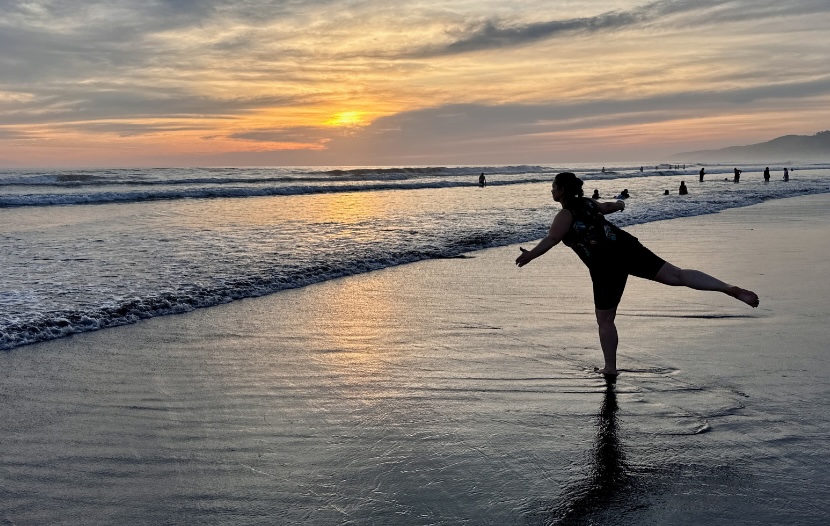EL SALVADOR — A little over five years ago, El Salvador was on the unenviable list of the world’s most violent countries.
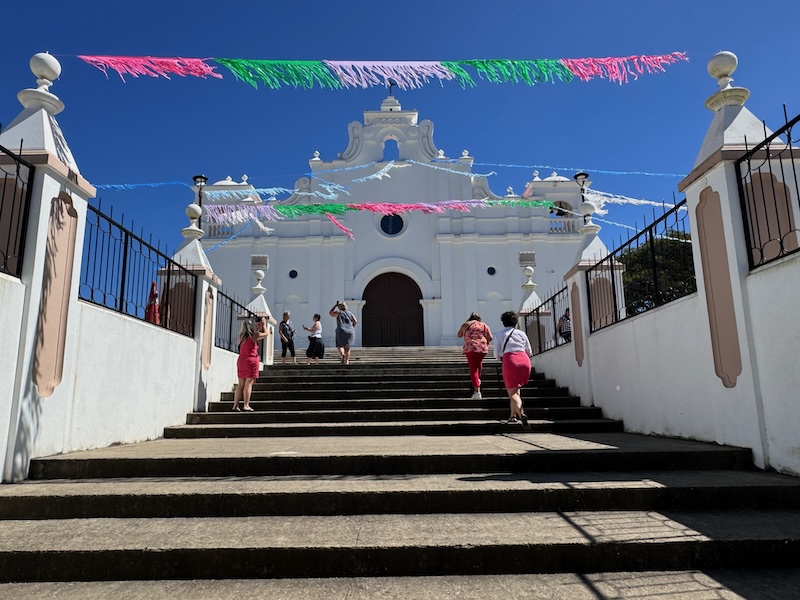
Apaneca – Photo: Gary Lawrence
Then came Nayib Bukele. Elected as El Salvador’s President in 2019, he’s spared no effort in enforcing law and order. In just a few years, the homicide rate has drastically dropped, and since then, President Bukele has been proclaiming to anyone who’ll listen that his country is the safest in the Americas – even safer than Canada, he claims.
THE LOWEST RATE MAKES THE LAW
While such a blanket statement is debatable, the fact remains that El Salvador’s crime rate is at its lowest level in years, and the country is, indeed, very safe, as Profession Voyages confirmed during a week-long trip hosted by CSATUC (the Salvadoran Chamber of Tourism in Canada), Voyages Munditour and Air Transat.
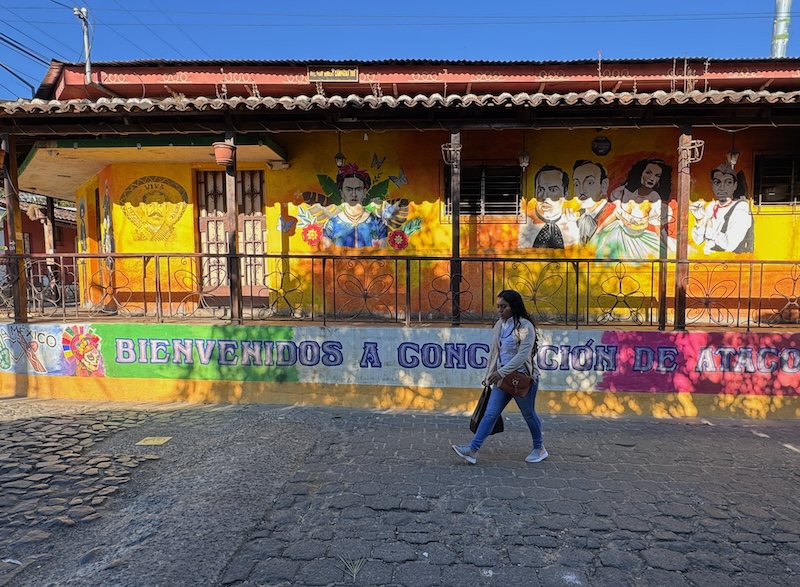
Ataco – Photo: Gary Lawrence
The U.S. embassy here even informed its 900 employees that there were no longer any restrictions on where they could travel in the country.
Despite this loosening of restrictions, Global Affairs Canada maintains its yellow alert level for El Salvador (‘Exercise a high degree of caution’) on its website. Do its experts know something that regular travellers don’t?
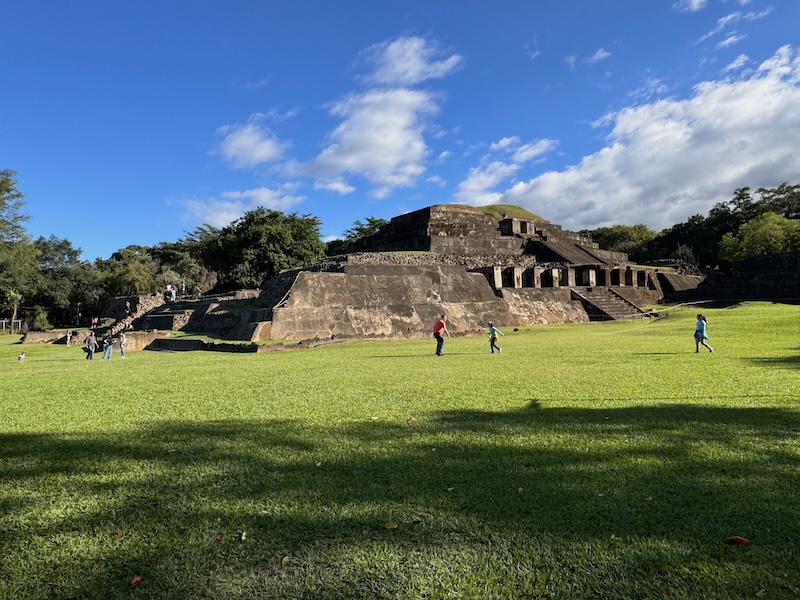
The Mayan site of Tazumal – Photo: Gary Lawrence
“We can’t lower El Salvador’s alert level below that of other Central American countries, or even below that of France, which is at the same level,” explains Mylène Paradis, Canada’s ambassador to El Salvador, who we met during our visit to the capital, San Salvador.
“Additionally, since emergency measures are still in place and authorities still have the right to carry out arbitrary arrests, we have no choice but to advise Canadian citizens to take a minimum level of precautions when traveling to El Salvador,” she adds.
While many innocent people were mistakenly arrested during the early years of President Bukele’s rule (and many are now being released), such arbitrary arrests are now much less frequent, if not non-existent.
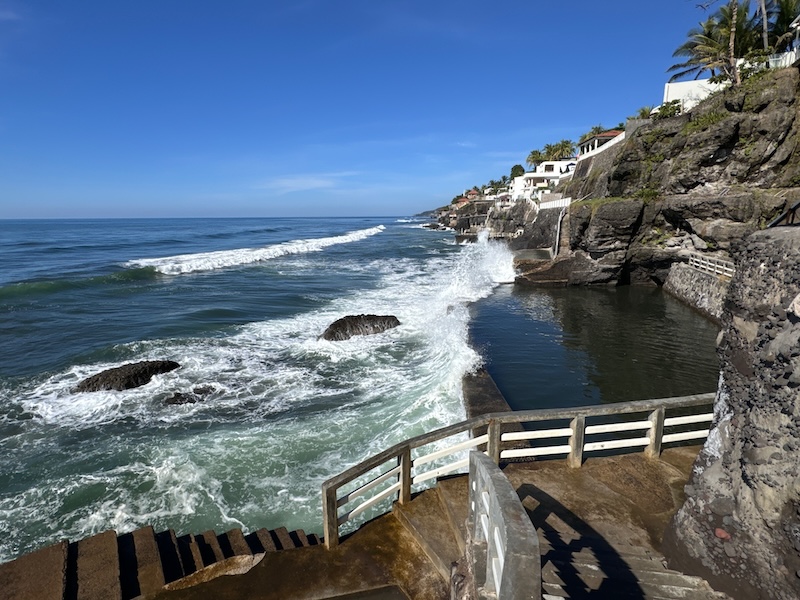
Hotel Acantilados, La Libertad – Photo: Gary Lawrence
Moreover, these summary arrests do not target tourists – only Salvadoran nationals (and likely illegal immigrants). As the Salvadoran government is actively developing its tourism industry, it cannot afford to tarnish its reputation in this regard.
Finally, the discreet military presence in the region (and the visible presence in the capital) attests to the seriousness with which the state is ensuring security in the country, in case new criminals emerge from the shadows.
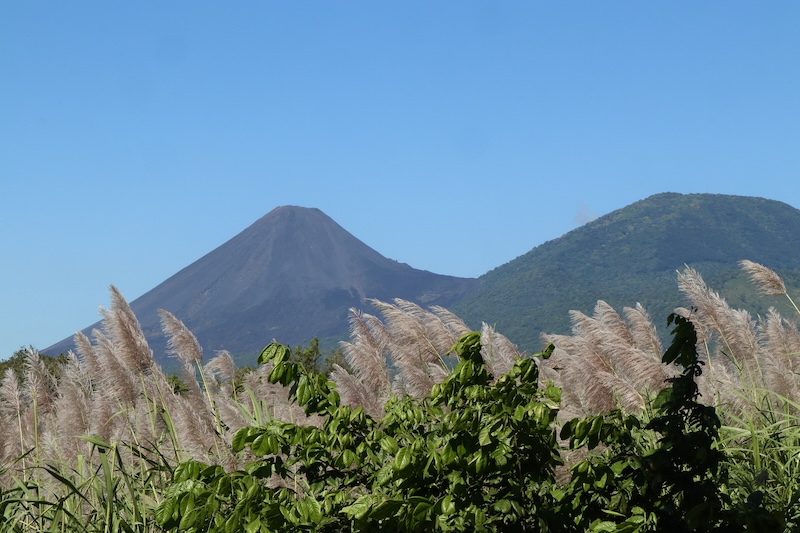
The Izalco and Cerro Verde volcanoes – Photo: Gary Lawrence
In fact, the country’s seismic activity – with some 6,000 tremors per year, some perceptible, some not – might be more concerning than the crime rate, as well as the presence of stray dogs in the streets of cities and villages. But these dogs are not dangerous, just a little intrusive, say locals.
A TOURIST RENAISSANCE
While travellers – mainly surfers and vacationers who stayed in their resorts – were already visiting the country when it was considered unsafe, more are coming now to (re)discover this country bordering Guatemala and Honduras.
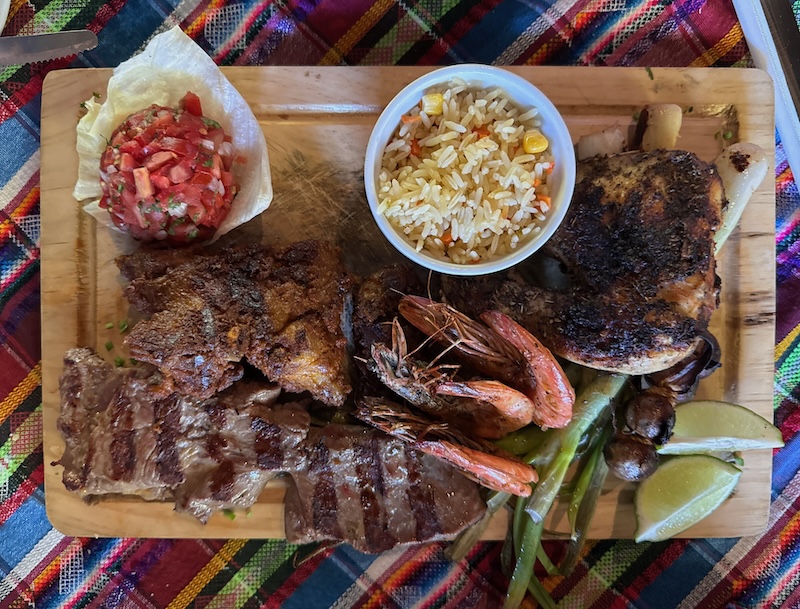
Grilling at Celeste’s Garden – Photo: Gary Lawrence
Locals seem to be on cloud nine, genuinely relieved that security levels have reached safe standards, and greeting visitors with welcoming smiles.
In the coming years, all signs indicate that El Salvador will increasingly make its mark on the Central American tourist map.
Surfers love the Pacific waves here, and development is already underway for Surf City II, a second tourist city dedicated to surfers and beach tourism. Judging by the atmosphere and quality of infrastructure (hotels, restaurants, bars) in the first Surf City in La Libertad, this new project is very promising.
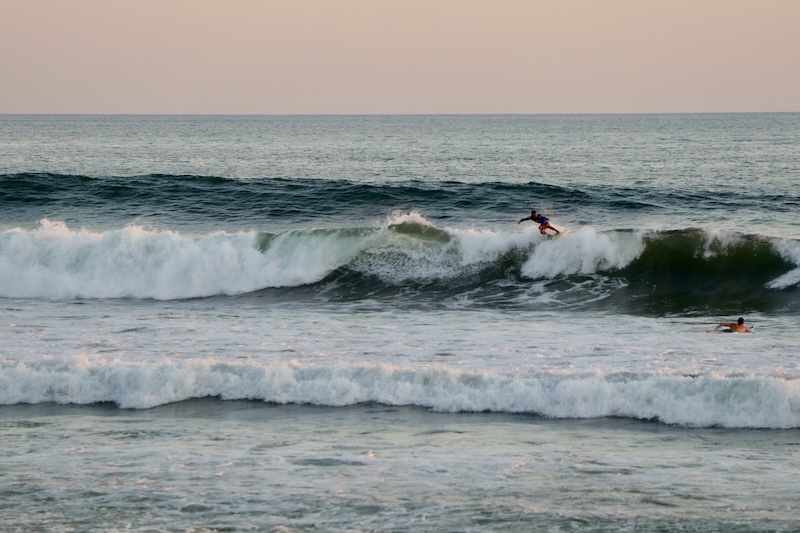
El Tunco, Surf City – Photo: Gary Lawrence
El Salvador will also soon begin construction on a second international airport. Already, 14 carriers serve El Salvador – including Air Transat, Avianca, Delta, United, American, Copa, Arajet and Aeromexico – and the country hopes to attract even more.
The latest visitor numbers support this growth. In 2023, 3.4 million foreign visitors came to El Salvador, a 33% increase from 2022. The Ministry of Tourism claims that El Salvador has had the highest tourism growth in the world since 2019.
Meanwhile, from January to October 2024, El Salvador saw a 19% year-over-year increase in visitors. The 10-month total reached 80% of the country’s goal of 3.8 million visitors for the year.
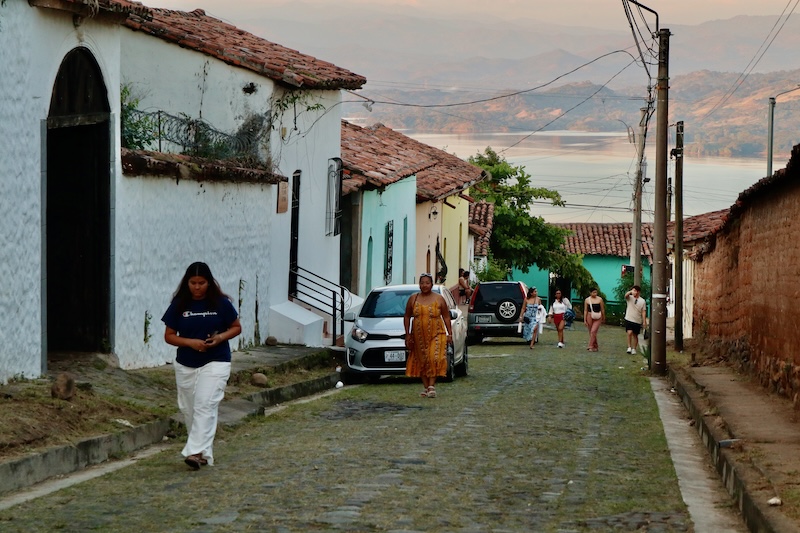
Suchitoto – Photo: Gary Lawrence
Most of El Salvador’s international visitors are Americans (1 million), followed by Guatemalans (643,000), Hondurans (410,000) and Canadians (48,000).
El Salvador’s tourism boosters still have their work cut out for them, but progress is being made. “I’ve been working on this for over two years with the Salvadoran Tourism Chamber in Canada, and this year things seem to be opening up,” says Johanne Gervais, President of Voyages Munditour in Laval, QC. “It’s really a country to see, it’s changed a lot recently, and it’s become very safe. The potential is enormous, and it’s a destination to experience beyond all-inclusive resorts.”
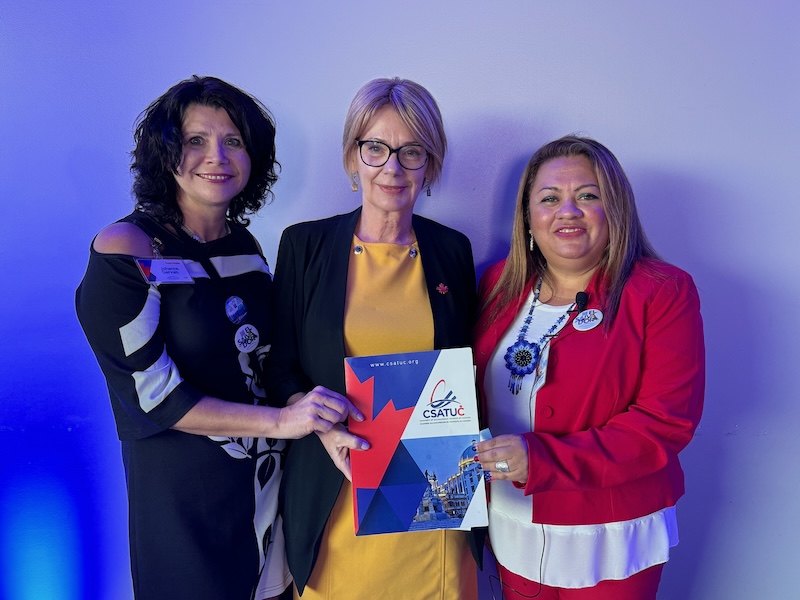
Johanne Gervais, President of Voyages Munditour; Mylène Paradis, Ambassador of Canada to El Salvador; and Lucia Soriano, President of CSATUC. – Photo: Gary Lawrence
Gervais adds: “We offer accommodation in nice little hotels that allow travellers to truly soak up the local ambiance and the spirit of the country. And since El Salvador is very small and its roads are the best in Central America, you can stick to three hotels over two weeks to explore and cover the entire country.”
GOOD TO KNOW
- In high season Air Transat connects Montreal to San Salvador twice a week (until March, then once a week until April)
- A specialist in Central America, Voyages Munditour has developed a high level expertise in El Salvador in Canada. It offers many escorted (or not) tours of El Salvador with various themes
- Founded to promote El Salvador as a tourist destination for Quebec and Canadian travellers, the CSATUC (Salvadoran Chamber of Tourism in Canada) is an excellent resource for obtaining information about the country.
For more information see CSATUC.org. This story originally appeared at ProfessionVoyages.com, part of The Travelweek Group.
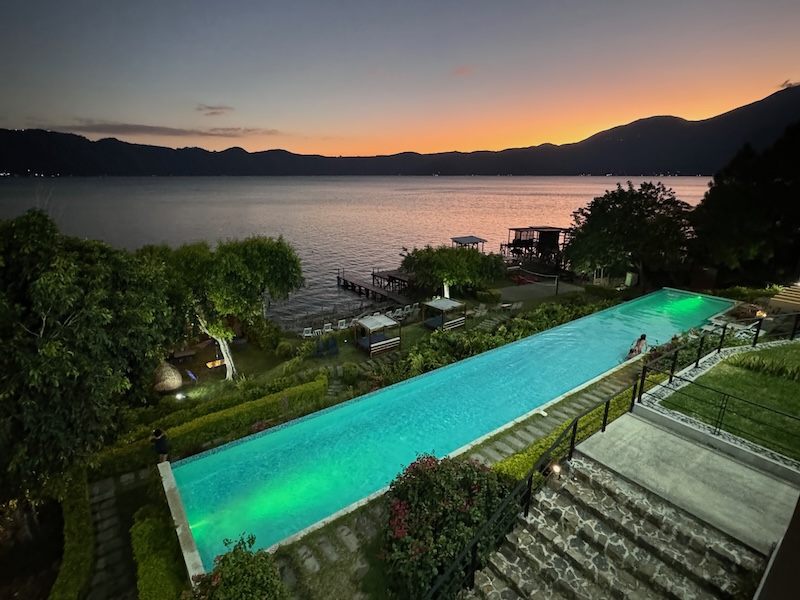
Hotel Cardedeu, Lake Coatepeque – Photo: Gary Lawrence

